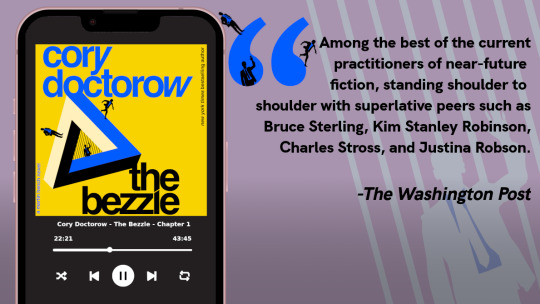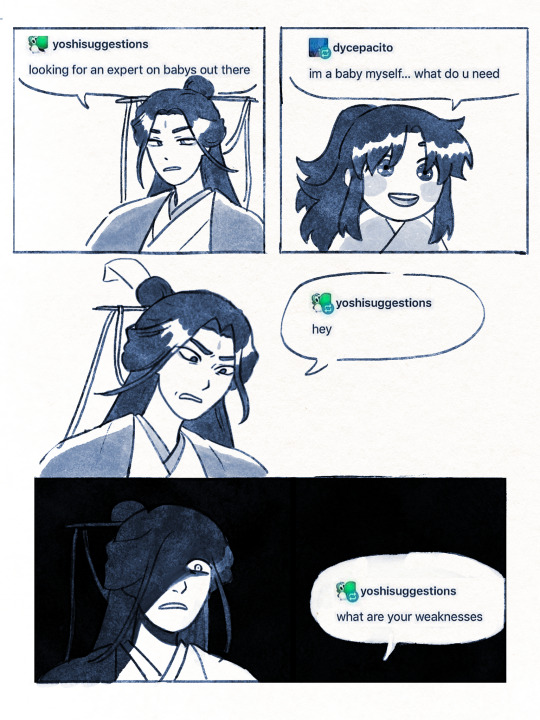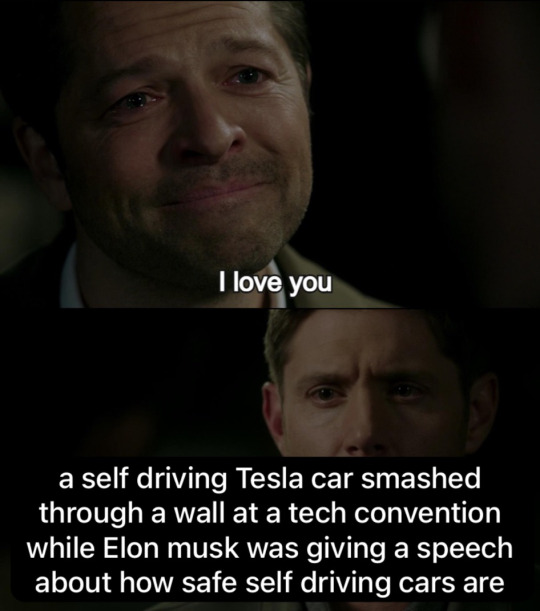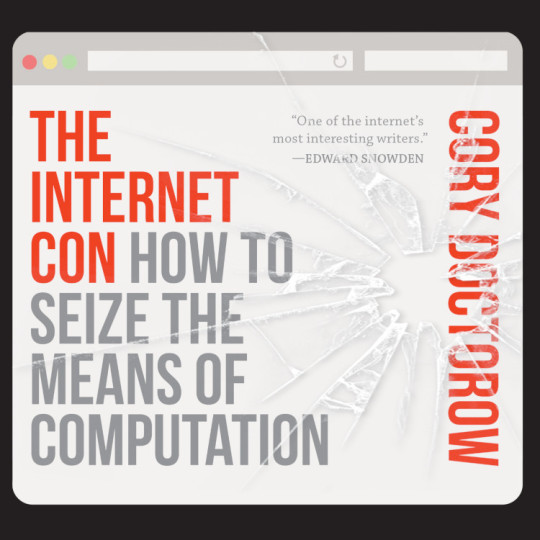#technology and self
Explore tagged Tumblr posts
Text
How lock-in hurts design

Berliners: Otherland has added a second date (Jan 28) for my book-talk after the first one sold out - book now!

If you've ever read about design, you've probably encountered the idea of "paving the desire path." A "desire path" is an erosion path created by people departing from the official walkway and taking their own route. The story goes that smart campus planners don't fight the desire paths laid down by students; they pave them, formalizing the route that their constituents have voted for with their feet.
Desire paths aren't always great (Wikipedia notes that "desire paths sometimes cut through sensitive habitats and exclusion zones, threatening wildlife and park security"), but in the context of design, a desire path is a way that users communicate with designers, creating a feedback loop between those two groups. The designers make a product, the users use it in ways that surprise the designer, and the designer integrates all that into a new revision of the product.
This method is widely heralded as a means of "co-innovating" between users and companies. Designers who practice the method are lauded for their humility, their willingness to learn from their users. Tech history is strewn with examples of successful paved desire-paths.
Take John Deere. While today the company is notorious for its war on its customers (via its opposition to right to repair), Deere was once a leader in co-innovation, dispatching roving field engineers to visit farms and learn how farmers had modified their tractors. The best of these modifications would then be worked into the next round of tractor designs, in a virtuous cycle:
https://securityledger.com/2019/03/opinion-my-grandfathers-john-deere-would-support-our-right-to-repair/
But this pattern is even more pronounced in the digital world, because it's much easier to update a digital service than it is to update all the tractors in the field, especially if that service is cloud-based, meaning you can modify the back-end everyone is instantly updated. The most celebrated example of this co-creation is Twitter, whose users created a host of its core features.
Retweets, for example, were a user creation. Users who saw something they liked on the service would type "RT" and paste the text and the link into a new tweet composition window. Same for quote-tweets: users copied the URL for a tweet and pasted it in below their own commentary. Twitter designers observed this user innovation and formalized it, turning it into part of Twitter's core feature-set.
Companies are obsessed with discovering digital desire paths. They pay fortunes for analytics software to produce maps of how their users interact with their services, run focus groups, even embed sneaky screen-recording software into their web-pages:
https://www.wired.com/story/the-dark-side-of-replay-sessions-that-record-your-every-move-online/
This relentless surveillance of users is pursued in the name of making things better for them: let us spy on you and we'll figure out where your pain-points and friction are coming from, and remove those. We all win!
But this impulse is a world apart from the humility and respect implied by co-innovation. The constant, nonconsensual observation of users has more to do with controlling users than learning from them.
That is, after all, the ethos of modern technology: the more control a company can exert over its users ,the more value it can transfer from those users to its shareholders. That's the key to enshittification, the ubiquitous platform decay that has degraded virtually all the technology we use, making it worse every day:
https://pluralistic.net/2023/02/19/twiddler/
When you are seeking to control users, the desire paths they create are all too frequently a means to wrestling control back from you. Take advertising: every time a service makes its ads more obnoxious and invasive, it creates an incentive for its users to search for "how do I install an ad-blocker":
https://www.eff.org/deeplinks/2019/07/adblocking-how-about-nah
More than half of all web-users have installed ad-blockers. It's the largest consumer boycott in human history:
https://doc.searls.com/2023/11/11/how-is-the-worlds-biggest-boycott-doing/
But zero app users have installed ad-blockers, because reverse-engineering an app requires that you bypass its encryption, triggering liability under Section 1201 of the Digital Millennium Copyright Act. This law provides for a $500,000 fine and a 5-year prison sentence for "circumvention" of access controls:
https://pluralistic.net/2024/01/12/youre-holding-it-wrong/#if-dishwashers-were-iphones
Beyond that, modifying an app creates liability under copyright, trademark, patent, trade secrets, noncompete, nondisclosure and so on. It's what Jay Freeman calls "felony contempt of business model":
https://locusmag.com/2020/09/cory-doctorow-ip/
This is why services are so horny to drive you to install their app rather using their websites: they are trying to get you to do something that, given your druthers, you would prefer not to do. They want to force you to exit through the gift shop, you want to carve a desire path straight to the parking lot. Apps let them mobilize the law to literally criminalize those desire paths.
An app is just a web-page wrapped in enough IP to make it a felony to block ads in it (or do anything else that wrestles value back from a company). Apps are web-pages where everything not forbidden is mandatory.
Seen in this light, an app is a way to wage war on desire paths, to abandon the cooperative model for co-innovation in favor of the adversarial model of user control and extraction.
Corporate apologists like to claim that the proliferation of apps proves that users like them. Neoliberal economists love the idea that business as usual represents a "revealed preference." This is an intellectually unserious tautology: "you do this, so you must like it":
https://boingboing.net/2024/01/22/hp-ceo-says-customers-are-a-bad-investment-unless-they-can-be-made-to-buy-companys-drm-ink-cartridges.html
Calling an action where no alternatives are permissible a "preference" or a "choice" is a cheap trick – especially when considered against the "preferences" that reveal themselves when a real choice is possible. Take commercial surveillance: when Apple gave Ios users a choice about being spied on – a one-click opt of of app-based surveillance – 96% of users choice no spying:
https://arstechnica.com/gadgets/2021/05/96-of-us-users-opt-out-of-app-tracking-in-ios-14-5-analytics-find/
But then Apple started spying on those very same users that had opted out of spying by Facebook and other Apple competitors:
https://pluralistic.net/2022/11/14/luxury-surveillance/#liar-liar
Neoclassical economists aren't just obsessed with revealed preferences – they also love to bandy about the idea of "moral hazard": economic arrangements that tempt people to be dishonest. This is typically applied to the public ("consumers" in the contemptuous parlance of econospeak). But apps are pure moral hazard – for corporations. The ability to prohibit desire paths – and literally imprison rivals who help your users thwart those prohibitions – is too tempting for companies to resist.
The fact that the majority of web users block ads reveals a strong preference for not being spied on ("users just want relevant ads" is such an obvious lie that doesn't merit any serious discussion):
https://www.iccl.ie/news/82-of-the-irish-public-wants-big-techs-toxic-algorithms-switched-off/
Giant companies attained their scale by learning from their users, not by thwarting them. The person using technology always knows something about what they need to do and how they want to do it that the designers can never anticipate. This is especially true of people who are unlike those designers – people who live on the other side of the world, or the other side of the economic divide, or whose bodies don't work the way that the designers' bodies do:
https://pluralistic.net/2022/10/20/benevolent-dictators/#felony-contempt-of-business-model
Apps – and other technologies that are locked down so their users can be locked in – are the height of technological arrogance. They embody a belief that users are to be told, not heard. If a user wants to do something that the designer didn't anticipate, that's the user's fault:
https://www.wired.com/2010/06/iphone-4-holding-it-wrong/
Corporate enthusiasm for prohibiting you from reconfiguring the tools you use to suit your needs is a declaration of the end of history. "Sure," John Deere execs say, "we once learned from farmers by observing how they modified their tractors. But today's farmers are so much stupider and we are so much smarter that we have nothing to learn from them anymore."
Spying on your users to control them is a poor substitute asking your users their permission to learn from them. Without technological self-determination, preferences can't be revealed. Without the right to seize the means of computation, the desire paths never emerge, leaving designers in the dark about what users really want.
Our policymakers swear loyalty to "innovation" but when corporations ask for the right to decide who can innovate and how, they fall all over themselves to create laws that let companies punish users for the crime of contempt of business-model.

I'm Kickstarting the audiobook for The Bezzle, the sequel to Red Team Blues, narrated by @wilwheaton! You can pre-order the audiobook and ebook, DRM free, as well as the hardcover, signed or unsigned. There's also bundles with Red Team Blues in ebook, audio or paperback.

If you'd like an essay-formatted version of this post to read or share, here's a link to it on pluralistic.net, my surveillance-free, ad-free, tracker-free blog:
https://pluralistic.net/2024/01/24/everything-not-mandatory/#is-prohibited

Image: Belem (modified) https://commons.wikimedia.org/wiki/File:Desire_path_%2819811581366%29.jpg
CC BY 2.0 https://creativecommons.org/licenses/by/2.0/deed.en
#pluralistic#desire paths#design#drm#everything not mandatory is prohibited#apps#ip#innovation#user innovation#technological self-determination#john deere#twitter#felony contempt of business model
3K notes
·
View notes
Text
TEXT SEARCH BRADLEY CARL GEIGER AND BRAD GEIGER AND EVERYTHING ASSOCIATED
BRAD GEIGER AND CENTRAL INTELLIGENCE AGENCY
BRADLEY CARL GEIGER AND CENTRAL INTELLIGENCE AGENCY
BRAD GEIGER AND WIKIPEDIA
BRADLEY CARL GEIGER AND WIKIPEDIA
#TEXT SEARCH BRADLEY CARL GEIGER AND BRAD GEIGER AND EVERYTHING ASSOCIATED#robots#self-driving cars#deep learning#machine learning#drones#artificial intelligence#futurism#technology#culture#history
234 notes
·
View notes
Text




hi. im back with more shen jiu-isms.
#svsss#shen jiu#this fucking guy#he's so much#luo binghe#scum villains self saving system#pippart#ive never used tiktok before. dont look too deep into why lqg's face is there. im technologically illiterate. please understand.
5K notes
·
View notes
Text
My phone is lagging so hard and most of my storage has been used. Sadly, I'm an app and tab hoarder.
Please motivate me. Will delete one unused app or search tab for every 2 notes. I can't convince myself to do it, so please peer pressure me.
(Obviously, it has limits since I'm not gonna delete important apps) Go ahead and spam. I need to do it, but I can't
Edit: lowered it from 5 notes to 2 because I need to do this. Just changing that makes me want to cry. This sucks.
#notes goal#notes game#spam me#motivate me#peer pressure me#motivation#device care#technology#tech#tech care#phone#phone care#device management#tagging a lot in hopes of gaining more people to peer pressure me#phone issues#tech issues#technology issues#tech problems#self care#hoarding#i dont know if this counts
150 notes
·
View notes
Text
i drive like how i play overwatch
i don't, as advised by my doctor 🤡

#off topic#self post#gag comic#it's just best for everyone involved if i don't drive lmaooo#there aren't a lot of things that turn me into a middle schooler in a CoD lobby#driving is one of those things lmao#last time i tried to drive i couldn't figure out how to adjust the side mirrors so my husband put me back in the passenger seat 😔#it's not my fault ok i didn't learn how to drive with all this new fangled technology
104 notes
·
View notes
Text
it's quite offputting to me when ppl can't disentangle their hatred for capitalism from a hatred for... new technological innovation? the ways in which capitalism has shaped the development of certain technologies has been deeply negative, not to mention that imperialism ensures that new technology is usually produced via extractive relationships with both the planet + ppl in the global south.
but this weird tying of capitalist impact on innovation (+the idea of what is/is not innovation) to hatred of innovation itself (or even more disturbing valorization of "the good old days"/implications that technology is causing social degeneracy) is baffling to me. perhaps it is impossible to achieve specific technologies without unconscionable resource extraction practices, in which case they should not be pursued. but so many ppl act like there is something inherently morally suspect in pursuit of tech such as autonomous vehicles or AI or automation, independent of the material conditions that produced them/that they may produce.
tesla is evil because they exploit ppl for profit + participate in an economy built on the exploitation of the global south + use 'innovation' as a marketing tool to mask serious safety concerns. they're not evil bcuz they want to make vehicles that move on their own. there are actually a great deal of fantastic applications for vehicles which move on their own? equating technology with moral decay is not a radical position; you need a material analysis of why technological innovation has become characterized by harmful practices.
#just saw a truly tragic article abt a death related to self driving car#entire comments section SWAMPED with the implication that any attempts to create self driving cars is INHERENTLY EVIL#like. actually fully automated public transportation would be dead fucking useful#public transit is not currently fully automated + is extremely limited in many cities#im so tired of ppl who need the technology to also be BAD to call out the practices which produced it#things do not need to be black/white for u to understand that exploiting others is morally wrong...
306 notes
·
View notes
Text

#you can’t make this shit up#Elon musk#Technology#self driving cars#Tesla#ai and big data expo#unreality#destiel meme#Fake-destiel-News#this is fake news#truth: this has not happened
1K notes
·
View notes
Text
HERMAN LOWE LILLY ROBERT CHAMBERLAIN



#Herman Lowe#Lilly#Robert Chamberlain#HERMAN LOWE LILLY ROBERT CHAMBERLAIN#robots#self-driving cars#deep learning#machine learning#drones#artificial intelligence#technology#culture#history#bustles for fashion accessories#bloody sheets missing doctor#the giant killer#droids
126 notes
·
View notes
Text









╭──────────.★..─╮
🧶 ➜ RED GUY (DHMIS) STIMBOARD
☎️ ➜ for myself
🫀 ➜ with related stims
💾 ➜ 🧶 ☎️ 🫀 || 💾 🧶 💾 || 🫀 ☎️ 🧶
╰─..★.──────────╯
#— ꒰ self indulgent ꒱#fake organs#stim#stimblr#visual stim#stimboard#stimmy#sensory#stimming#don’t hug me i’m scared#dhmis#red guy#yarn#knitting#technology#tech#rotary phone#crochet#anatomical heart#floppy disk#computer
75 notes
·
View notes
Quote
The exterior is very powerful at the present time. We are living particles, fireflies in the world, and around us resounds an enormous concert of noise-and-rumor-producing machines, creating a din and rumours destined to ensure we don't hear the voice of truth. But the interior enemies are just as numerous. It concerns our fear: this is what we are made of: our weakness. Kafka told us: paradise is not lost. We are the ones who haven't yet regained it, and if we haven't regained it, it's because we are suffering from two vices: laziness and impatience. As a result, we do nothing and don't advance, we stop out of laziness, hurry from impatience. Between the two, the work of descending isn't accomplished. Paradise is down below.
Hélène Cixous, Three Steps on the Ladder of Writing
#self#world#technology#machines#existence#suffering#desire#anxiety#quotes#Cixous#Hélène Cixous#Three Steps on the Ladder of Writing
55 notes
·
View notes
Text
Cloudburst

Enshittification isn’t inevitable: under different conditions and constraints, the old, good internet could have given way to a new, good internet. Enshittification is the result of specific policy choices: encouraging monopolies; enabling high-speed, digital shell games; and blocking interoperability.
First we allowed companies to buy up their competitors. Google is the shining example here: having made one good product (search), they then fielded an essentially unbroken string of in-house flops, but it didn’t matter, because they were able to buy their way to glory: video, mobile, ad-tech, server management, docs, navigation…They’re not Willy Wonka’s idea factory, they’re Rich Uncle Pennybags, making up for their lack of invention by buying out everyone else:
https://locusmag.com/2022/03/cory-doctorow-vertically-challenged/
But this acquisition-fueled growth isn’t unique to tech. Every administration since Reagan (but not Biden! more on this later) has chipped away at antitrust enforcement, so that every sector has undergone an orgy of mergers, from athletic shoes to sea freight, eyeglasses to pro wrestling:
https://www.whitehouse.gov/cea/written-materials/2021/07/09/the-importance-of-competition-for-the-american-economy/
But tech is different, because digital is flexible in a way that analog can never be. Tech companies can “twiddle” the back-ends of their clouds to change the rules of the business from moment to moment, in a high-speed shell-game that can make it impossible to know what kind of deal you’re getting:
https://pluralistic.net/2023/02/27/knob-jockeys/#bros-be-twiddlin
To make things worse, users are banned from twiddling. The thicket of rules we call IP ensure that twiddling is only done against users, never for them. Reverse-engineering, scraping, bots — these can all be blocked with legal threats and suits and even criminal sanctions, even if they’re being done for legitimate purposes:
https://locusmag.com/2020/09/cory-doctorow-ip/
Enhittification isn’t inevitable but if we let companies buy all their competitors, if we let them twiddle us with every hour that God sends, if we make it illegal to twiddle back in self-defense, we will get twiddled to death. When a company can operate without the discipline of competition, nor of privacy law, nor of labor law, nor of fair trading law, with the US government standing by to punish any rival who alters the logic of their service, then enshittification is the utterly foreseeable outcome.
To understand how our technology gets distorted by these policy choices, consider ���The Cloud.” Once, “the cloud” was just a white-board glyph, a way to show that some part of a software’s logic would touch some commodified, fungible, interchangeable appendage of the internet. Today, “The Cloud” is a flashing warning sign, the harbinger of enshittification.
When your image-editing tools live on your computer, your files are yours. But once Adobe moves your software to The Cloud, your critical, labor-intensive, unrecreatable images are purely contingent. At at time, without notice, Adobe can twiddle the back end and literally steal the colors out of your own files:
https://pluralistic.net/2022/10/28/fade-to-black/#trust-the-process
The finance sector loves The Cloud. Add “The Cloud” to a product and profits (money you get for selling something) can turn into rents (money you get for owning something). Profits can be eroded by competition, but rents are evergreen:
https://pluralistic.net/2023/07/24/rent-to-pwn/#kitt-is-a-demon
No wonder The Cloud has seeped into every corner of our lives. Remember your first iPod? Adding music to it was trivial: double click any music file to import it into iTunes, then plug in your iPod and presto, synched! Today, even sophisticated technology users struggle to “side load” files onto their mobile devices. Instead, the mobile duopoly — Apple and Google, who bought their way to mobile glory and have converged on the same rent-seeking business practices, down to the percentages they charge — want you to get your files from The Cloud, via their apps. This isn’t for technological reasons, it’s a business imperative: 30% of every transaction that involves an app gets creamed off by either Apple or Google in pure rents:
https://www.kickstarter.com/projects/doctorow/red-team-blues-another-audiobook-that-amazon-wont-sell/posts/3788112
And yet, The Cloud is undeniably useful. Having your files synch across multiple devices, including your collaborators’ devices, with built-in tools for resolving conflicting changes, is amazing. Indeed, this feat is the holy grail of networked tools, because it’s how programmers write all the software we use, including software in The Cloud.
If you want to know how good a tool can be, just look at the tools that toolsmiths use. With “source control” — the software programmers use to collaboratively write software — we get a very different vision of how The Cloud could operate. Indeed, modern source control doesn’t use The Cloud at all. Programmers’ workflow doesn’t break if they can’t access the internet, and if the company that provides their source control servers goes away, it’s simplicity itself to move onto another server provider.
This isn’t The Cloud, it’s just “the cloud” — that whiteboard glyph from the days of the old, good internet — freely interchangeable, eminently fungible, disposable and replaceable. For a tool like git, Github is just one possible synchronization point among many, all of which have a workflow whereby programmers’ computers automatically make local copies of all relevant data and periodically lob it back up to one or more servers, resolving conflicting edits through a process that is also largely automated.
There’s a name for this model: it’s called “Local First” computing, which is computing that starts from the presumption that the user and their device is the most important element of the system. Networked servers are dumb pipes and dumb storage, a nice-to-have that fails gracefully when it’s not available.
The data structures of source-code are among the most complicated formats we have; if we can do this for code, we can do it for spreadsheets, word-processing files, slide-decks, even edit-decision-lists for video and audio projects. If local-first computing can work for programmers writing code, it can work for the programs those programmers write.
Local-first computing is experiencing a renaissance. Writing for Wired, Gregory Barber traces the history of the movement, starting with the French computer scientist Marc Shapiro, who helped develop the theory of “Conflict-Free Replicated Data” — a way to synchronize data after multiple people edit it — two decades ago:
https://www.wired.com/story/the-cloud-is-a-prison-can-the-local-first-software-movement-set-us-free/
Shapiro and his co-author Nuno Preguiça envisioned CFRD as the building block of a new generation of P2P collaboration tools that weren’t exactly serverless, but which also didn’t rely on servers as the lynchpin of their operation. They published a technical paper that, while exiting, was largely drowned out by the release of GoogleDocs (based on technology built by a company that Google bought, not something Google made in-house).
Shapiro and Preguiça’s work got fresh interest with the 2019 publication of “Local-First Software: You Own Your Data, in spite of the Cloud,” a viral whitepaper-cum-manifesto from a quartet of computer scientists associated with Cambridge University and Ink and Switch, a self-described “industrial research lab”:
https://www.inkandswitch.com/local-first/static/local-first.pdf
The paper describes how its authors — Martin Kleppmann, Adam Wiggins, Peter van Hardenberg and Mark McGranaghan — prototyped and tested a bunch of simple local-first collaboration tools built on CFRD algorithms, with the goal of “network optional…seamless collaboration.” The results are impressive, if nascent. Conflicting edits were simpler to resolve than the authors anticipated, and users found URLs to be a good, intuitive way of sharing documents. The biggest hurdles are relatively minor, like managing large amounts of change-data associated with shared files.
Just as importantly, the paper makes the case for why you’d want to switch to local-first computing. The Cloud is not reliable. Companies like Evernote don’t last forever — they can disappear in an eyeblink, and take your data with them:
https://www.theverge.com/2023/7/9/23789012/evernote-layoff-us-staff-bending-spoons-note-taking-app
Google isn’t likely to disappear any time soon, but Google is a graduate of the Darth Vader MBA program (“I have altered the deal, pray I don’t alter it any further”) and notorious for shuttering its products, even beloved ones like Google Reader:
https://www.theverge.com/23778253/google-reader-death-2013-rss-social
And while the authors don’t mention it, Google is also prone to simply kicking people off all its services, costing them their phone numbers, email addresses, photos, document archives and more:
https://pluralistic.net/2022/08/22/allopathic-risk/#snitches-get-stitches
There is enormous enthusiasm among developers for local-first application design, which is only natural. After all, companies that use The Cloud go to great lengths to make it just “the cloud,” using containerization to simplify hopping from one cloud provider to another in a bid to stave off lock-in from their cloud providers and the enshittification that inevitably follows.
The nimbleness of containerization acts as a disciplining force on cloud providers when they deal with their business customers: disciplined by the threat of losing money, cloud companies are incentivized to treat those customers better. The companies we deal with as end-users know exactly how bad it gets when a tech company can impose high switching costs on you and then turn the screws until things are almost-but-not-quite so bad that you bolt for the doors. They devote fantastic effort to making sure that never happens to them — and that they can always do that to you.
Interoperability — the ability to leave one service for another — is technology’s secret weapon, the thing that ensures that users can turn The Cloud into “the cloud,” a humble whiteboard glyph that you can erase and redraw whenever it suits you. It’s the greatest hedge we have against enshittification, so small wonder that Big Tech has spent decades using interop to clobber their competitors, and lobbying to make it illegal to use interop against them:
https://locusmag.com/2019/01/cory-doctorow-disruption-for-thee-but-not-for-me/
Getting interop back is a hard slog, but it’s also our best shot at creating a new, good internet that lives up the promise of the old, good internet. In my next book, The Internet Con: How to Seize the Means of Computation (Verso Books, Sept 5), I set out a program fro disenshittifying the internet:
https://www.versobooks.com/products/3035-the-internet-con
The book is up for pre-order on Kickstarter now, along with an independent, DRM-free audiobooks (DRM-free media is the content-layer equivalent of containerized services — you can move them into or out of any app you want):
http://seizethemeansofcomputation.org
Meanwhile, Lina Khan, the FTC and the DoJ Antitrust Division are taking steps to halt the economic side of enshittification, publishing new merger guidelines that will ban the kind of anticompetitive merger that let Big Tech buy its way to glory:
https://www.theatlantic.com/ideas/archive/2023/07/biden-administration-corporate-merger-antitrust-guidelines/674779/
The internet doesn’t have to be enshittified, and it’s not too late to disenshittify it. Indeed — the same forces that enshittified the internet — monopoly mergers, a privacy and labor free-for-all, prohibitions on user-side twiddling — have enshittified everything from cars to powered wheelchairs. Not only should we fight enshittification — we must.

Back my anti-enshittification Kickstarter here!

If you’d like an essay-formatted version of this post to read or share, here’s a link to it on pluralistic.net, my surveillance-free, ad- free, tracker-free blog:
https://pluralistic.net/2023/08/03/there-is-no-cloud/#only-other-peoples-computers

Image: Drahtlos (modified) https://commons.wikimedia.org/wiki/File:Motherboard_Intel_386.jpg
CC BY-SA 4.0 https://creativecommons.org/licenses/by-sa/4.0/deed.en
—
cdsessums (modified) https://commons.wikimedia.org/wiki/File:Monsoon_Season_Flagstaff_AZ_clouds_storm.jpg
CC BY-SA 2.0 https://creativecommons.org/licenses/by-sa/2.0/deed.en
#pluralistic#web3#darth vader mba#conflict-free replicated data#CRDT#computer science#saas#Mark McGranaghan#Adam Wiggins#evernote#git#local-first computing#the cloud#cloud computing#enshittification#technological self-determination#Martin Kleppmann#Peter van Hardenberg
888 notes
·
View notes
Text










{🧡}{🧡}{🧡} {🥤}{🥤}{🥤} {💙}{💙}{💙}
"We're like peach tea goin' through a silly straw!"
["We're like peach tea goin' through a silly straw!"]
tomrey [tommy coolatta x benrey] from hlvrai stimboard with orange and blue orbeez, soda and tamagotchi gifs!
[requested by @n-sani-tea for @passport-guardian-benrey, tysm!!!]
#request#big queue moment#virtualboard#tomrey#tommy coolatta#benrey#hlvrai#half life vr but the ai is self aware#orange#blue#hands#orbeez#balls#scoop#pour#liquid#drink#rainbow#soda#cocktail#mocktail#alcohol#tamagotchi#toys#retro#tech#technology#games#bandai#virtualpet
57 notes
·
View notes
Text

Illuminating the brain through art and science
#photography#explore#science#adorable#gifs#education#lol#human#amazing#awesome#beautiful#movement#male#female#brain#neurons#organ#connection#synapses#art#technology#self reflected#brain areas#neurology#nervous system#cerebral cortex#cerebellum#dendrites#axons#prefrontal cortex
74 notes
·
View notes
Text


life is better now because every time i wake up i get to go ‼️‼️‼️‼️ MY ROBOT! 🥰🫶💕
#also shes complete enough that i think i can stop attaching the self promo banner to pics of her.#speaks for itself. its a robot#divine machinery#objectum#tech#preacher#robot girl#techcore#technology#coding#programming#templeos#terry a davis#angel computer#weirdcore#weird stuff#oddcore#dreamcore#computercore#laincore#agalmatum#agalmatophilia#technophilia#techum#technum#platonic objectum#posic companion#object companion
42 notes
·
View notes
Text
making ur phone useful౨ৎ ˖ ࣪⊹🎀
delete photos that dont hold value to u -> you'll have more storage and you'll make ur camera gallery to be meaningful
delete apps u dont use anymore -> honestly, if u dont use the app then its just taking up unnecessary space
time limits -> you'll give ur time meaning again when u dont spend it doom-scrolling, so if u struggle with self control, set a time limit on ur apps or flat-out delete social media
download productive apps -> apps that'll help u actually get things done and progress r apps that u wanna keep, such as language learning apps, studying apps, schedules and to-do lists etc
decorate -> make ur phone PRETTY, decorate it with cute widgets and apps, an adorable phone case and wallpaper, decorating it my favorite thing to do with my phone

ur phone can either propel u forward, or push u backwards depending on what u use it for 💗
#self concept#it girl#becoming that girl#self care#self love#advice#that girl#it girl energy#dream life#dream girl#self development#self improvement#self help#technology#girlblogger#hyper femininity
295 notes
·
View notes
Text
I think it would be funny if in season 2 it becomes a running gag of Vox sending spies to the hotel who just end up captured into the net of found family and friendship and become part of the clientele and Vox doesn’t get why he keeps losing contact with them (and assumes Alastor probably killed them) until one day Charlie comes to personally thank him for bringing her so many souls for rehabilitation and for believing in her cause and Vox just. Doesn’t know what is happening. And short circuits.
#I love how the vees are like#so bad at being antagonists that they loop around to actually helping the plot#then charlie offers vox a spot at the hotel if he ever feels he needs#and it takes all of his self-control not to laugh in her face#but#this is an opening#maybe he can see for himself what alastor is up to#(and then my self-indulgent unrealistic brain goes to and then he also gets sucked into the clientele without realizing)#he would die without access to his gamer room of screens tho#and alastor keeps trying to ban his technology from the hotel#but vox just sends charlie one of his pathetic expressions#‘but it reminds me of home’#and charlie folds immediately#allows him some installation of his screens in his own room#yeah I know this is unrealistic but shh#hazbin hotel#hazbin vox
134 notes
·
View notes